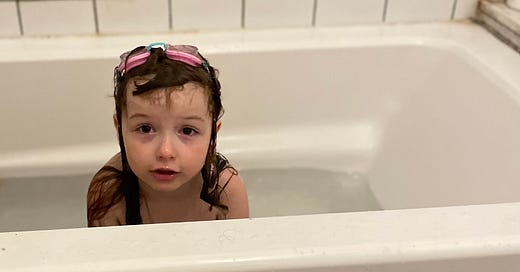Not bathing your child? Mila Kunis, Ashton Kutcher, Kristin Bell and Dax Shepard all think that’s A-Ok.
You might have heard about this on the news or social media a couple of weeks ago. And since then there’s been backlash against these celebrities.
One of the criticisms beyond “Ew, gross,” is that this parenting choice reflects privilege these stars don’t acknowledge.
For some, the privilege not to bath is just a raw reminder of systematic racism.
I saw this criticism directed at a discussion on Dax Shepard’s podcast, where the before-mentioned celebrities revealed some child rearing choices.
According to a number of voices on Twitter and elsewhere, these choices are possible because they are all White people.
If you don’t know what the two couples said in the podcast, here’s it in short:
Basically they shared that they give baths to their children a lot less than many parents believe they should.
To the point where they tend to only do it when there’s visible dirt or odor.
This isn’t really as radical as it may sound. Pediatricians actually support this choice, saying that too regular bathing can be harmful to the skin and really isn’t all that necessary. The idea of a daily bath is really just part of cultural American standards, rather than based on scientific fact.
The reaction overall to the admission to allowing their children to skip bathing has been mixed.
Some say that they should have kept this child-rearing tidbit private, others thought it was bad parenting, others said they supported their choice but didn’t agree themselves.
Others, like me, thought, “that’s exactly what I do.”
But, in all that feedback, it wasn’t until I saw the argument about privilege that I thought much about this offhand confession of not regularly bathing their children.
Writer Jemele Hill wrote on Twitter that, “Black folks don’t have the luxury.”
Because of traditional racist beliefs that Black people are naturally unclean, the writer claimed they feel pressure to be as “obsessively” clean as possible.
In fact, a number of Twitter users agreed and said that Black people who told the world that they didn’t bath their children regularly have a good chance of having CPS called on them.
This disparity in parenting expectations was astounding to me.
There’s basically a double standard— this quirky thing some white parents do then becomes neglect when Black parents do it.
According to Shereen White, director of advocacy and policy at Children's Rights:
What this boils down to is, throughout the history of this country… there has always been a sort of policing of Black families that does not exist for white parents… and we’re so aware of that surveillance — we’re so aware of the potential to have a mandated reporter call it in if our children and lives are not perfect according to the standards held by white America.
It never occurred to me that Black people feel this pressure. I also didn’t know the extent that systematic inequalities have an effect on what parenting practices are considered acceptable.
White, and especially wealthy white, people have more freedom to do non-mainstream parenting practices.
The fact is, there is an issue when half of Black families are subjected to CPS investigations, the majority of which are based on accusations of neglect.
White also said:
Black families are more likely to be called in for abuse and neglect than white families, so we think about that in everything we do — it’s always hanging over your heads in a way it’s not for white families and parents, who don’t have that threat, of having [kids] removed because they’re dirty, which is a real reason.
If you are like me, especially if you are rocking any privilege, it helps to be educated about these sorts of disparities.
That doesn’t mean Dax, Kristin, Mila, Ashton, and even I, need to feel ashamed about perfectly healthy parenting choices that may not be mainstream. But it’s important to recognize the privilege of being able to make that sort of choice. And that opens up discussion for how to address the disparity and inequality that exists in America.
What do you think? Were you aware of this cultural disparity?
I would love to hear what you think:
Like this “Briefly”? Here’s a new article you might enjoy.




